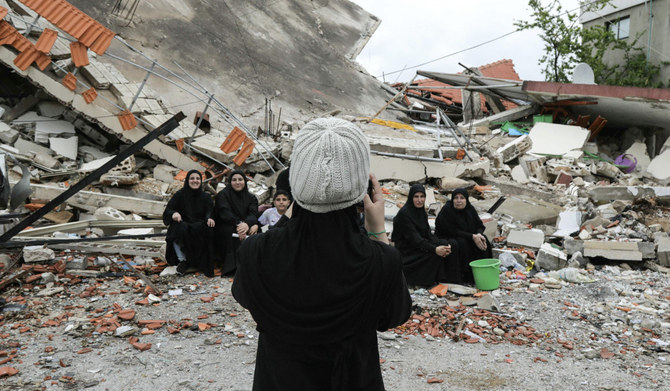
- ARAB NEWS
- 09 Jul 2025

BEIRUT: On the final day of Ramadan, villages and towns along the Lebanese border with Israel were not as active as usual while preparing for Eid Al-Fitr, despite occasional periods of calm in fighting between Hezbollah and Israeli forces.
There was barely any Eid shopping in the markets, particularly in the big cities such as Bint Jbeil, Khiam, Naqoura and Mays Al-Jabal.
In towns farther from the border, to which residents of the frontline towns had fled, “Eid has no meaning as long as the firing of destructive rockets and shells at homes and anything that moves on the roads continues,” said Samer, a father of two. “The terrifying sounds of these explosions have instilled fear in our souls.”
More than 27,000 people have been displaced in the city of Tyre and its nearby areas, with hundreds living in shelters.
The city’s markets reported reasonable shopper activity, but purchases were restricted to children’s clothing and food supplies.
Maryam, a mother of five, said that “people are facing extreme hardships and cannot afford necessities for their children … because their salaries have been greatly affected by the economic downturn in the south. Additionally, the prevailing atmosphere of fear and anxiety caused by Israeli attacks has further worsened the situation.”
During a visit to southern commercial markets, Mohammed Saleh, leader of the Chamber of Commerce, Agriculture and Industry in Sidon and South Lebanon, said that Israeli attacks in the region had caused a 40 percent fall in economic activity.
Saleh added: “Today I visited the markets of Sidon and found them to be the most affected among the cities in the south, with a decline rate of 70 percent, while the decline rate in Nabatiyeh and Tyre is only 30 percent.
“The reason is that these two cities host the largest percentage of displaced people from the border areas, and they want to eat, drink and shop for their children.”
Saleh’s comments came as Hezbollah launched a series of operations against Israeli military sites in the southern border area on Tuesday.
According to a statement, the party targeted “Zibdin barracks in the Shebaa Farms with missile weapons, causing direct hits.” The group also claimed to have killed and injured Israeli soldiers and destroyed a Merkava tank in an attack on Doviv barracks.
Israeli news websites reported the launch of four missiles from Lebanon toward Israeli army positions in the occupied Lebanese Shebaa Farms.
Lebanese border towns Debl and Tayr Harfa faced Israeli artillery shelling, as did the village of Yaroun.
A security source in the region noted “a new pattern of the rules of engagement, following Israeli threats of open war against Lebanon.”
The source said: “Any Israeli targeting of the Bekaa region in eastern Lebanon is met with Hezbollah targeting military sites in the occupied Golan, without claiming responsibility for the operations.
“This is what happened after the downing of the Israeli drone, a Hermes 900, two days ago, as Israeli warplanes shelled Hezbollah centers in the Bekaa hours later, and the party responded the next day by launching a barrage of Katyusha rockets at the Israeli Keila barracks in the occupied Syrian Golan and targeting the Yoav barracks.”